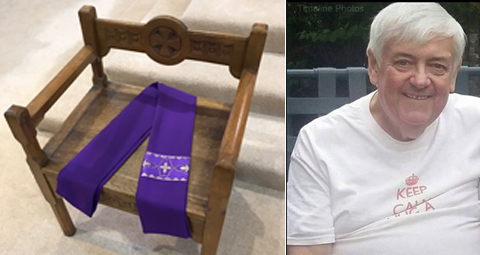May 26 | ![]() 0 COMMENTS
0 COMMENTS ![]() print
print

The empty spaces we leave behind
THE BOW IN THE HEAVENS pays tribute to much-loved parish deacon Paul Rodgers who died on May 17 - Fr JOHN BOLLAN
They say a week is a long time in politics. Well, it seems like an even longer time in the life of this wee parish. In the seven days which have elapsed since filing last week’s column, the Good Lord called Deacon Paul to himself, bringing an end to his brave fight with cancer.
From initial diagnosis to Paul’s death last Wednesday, I reckon we’re talking only a matter of about nine months: the average gestation period of a human life was, more or less, the time Paul had to get ready for his birth to eternal life. Indeed, as I write this, it would have been his 65th birthday.
You can imagine what sort of thoughts will be in the minds of his wife and family as they go about making Paul’s funeral arrangements rather than springing a party on him.
Thanks to Harold Shipman and our national love of queuing, the registration of a death is no longer the quick and easy formality of yesteryear.
A knock-on effect of this is that there is often a fairly lengthy hiatus between the death of a loved one and the final farewell. For some families, this gap may allow them some extra time to adjust to what has happened, but for others, I imagine that this waiting only serves to prolong their distress.
There is also an element of novelty in Deacon Paul’s death, both for us as a parish and a diocese: I think this is the first time we have been confronted with the death of a cleric who is also a husband, a father and grandfather.
When a priest dies, often at a great age, the nearest remaining relatives tend to be nephews and nieces (and their children) and they tend to look to the Church to steer the arrangements. But in Deacon Paul’s case, we have to hang back a little and ensure that his family know that they are in the driving seat.
That’s not to say, of course, that we as a parish are not mourners, for we surely are. Ever since Paul’s illness was made public, the good folk of St Joseph’s have rallied round with their prayers and a great many expressions of concern. The children in the primary school have been especially good in sending Paul and the family cards and other little reminders of their closeness in prayer.
Throughout these months of illness, Paul’s chair (right) in the sanctuary has been a powerful symbol of his ministry. Even though it was empty more often than it was occupied, it reminded us that we had a Deacon who was still present among us in prayer and still witnessing to the Lord in his acceptance of being poked, prodded and carted in and out of hospital.
Just as the bishop’s chair, his cathedra, sits there as a sign of his authority and is his alone, so too in a more modest way Paul’s chair has served a similar purpose. Once I had been informed of his death, not long after I had said my farewells to him, I placed his stole upon the chair and there it will remain until his funeral. After that, I think we’ll have to ‘decommission’ the chair out of respect and move it to the sacristy.
I suppose in that sense the parish is no different to any grieving spouse or family: the loss of a loved one often makes its absence felt in the fixtures of daily life—the empty chair, a side of the bed now unoccupied, a place at the table unfilled.
We are deluding ourselves if we think that anyone or anything can ever fill out the unique contours of their places in our hearts and lives.
In that sense, the words of last Sunday’s Gospel (and this week’s too) are particularly apposite. They speak to us of the Holy Spirit as the Comforter and Consoler par excellence: as breath has no limits, so only the Paraclete can fill the void of grief. What held true for the Apostles, is also true for us. The Sequence for Pentecost, the Veni, Sancte Spiritus is really a hymn for mourners.
As we celebrate Communications Sunday this week, we are invited to reflect on the nature and quality of our everyday communication. A great deal of this is now carried out online, through texts and messages sent in the twinkling of an eye. Although the process may be instantaneous, it’s worth remembering that the messages we send—and the effect of those messages—can last a very long time indeed.
For example, I think I’ll treasure the last text sent to my Deacon Paul as he signs himself off as ‘Deak’: I had been using this form of address for some time, even though I suspected he wasn’t keen on it (it being all a bit too River City for him).
The kind of text messages I have been receiving from Rose, one of the housekeepers, has certainly changed of late. Since becoming a gran for the first time, it’s gone from tersely worded questions (e.g. ‘What time lunch?’) to director’s cut videos of baby Findlay gurgling and smiling.
Still, who would begrudge a new granny the joys of her newfound status? Not me, for sure. I wouldn’t want to jeopardise my supply of Rose’s delicious pot noodle and piri piri chicken.
It is rather lovely, though, witnessing the joy a new arrival brings to a family. There’s a definite spring in Rose’s step and I think that baby Findlay is successfully distracting Granda Jim from the additional workload of counting the new £1 coins on a Sunday. Attentive readers will deduce that I haven’t yet sorted out a new machine to help out the money changers.
Elsewhere, life is ticking over for us, as in every parish. We have a deanery meeting on Wednesday morning, although an existing commitment means I can only stay for about an hour. This leaves me in a rather vulnerable position since, as I mentioned in a previous account of deanery meetings, those who leave early routinely get volunteered to take on additional responsibilities. I will, however, be Churchillian in my refusal to kowtow to such underhand tactics.
The Holyday of Obligation on Ascension Thursday will, like as not, catch folk out despite being heavily advertised in bulletins and social media. As a sizeable proportion of the upper school in St Columba’s will still be on study leave, we will just have two Masses in the school itself, instead of us descending en masse upon St Andrew’s next door. I’m grateful to Mgr Gerard Gallagher from Gourock for helping with the second of these Masses. Despite the Machiavellian manoeuvres of the deanery meeting, we are actually very good at helping each other out whenever possible.
Of course, one of the main challenges that we all face is that there are fewer of us about than in previous generations. While most folk are understanding that changed circumstances mean reduced provision of ‘services,’ I think there is still a bit of residual guilt among priests if they can cannot maintain what was previously taken for granted.
To offer an example, this is the first year since I’ve been here (and probably, therefore, the first time ever) that we had no May devotions on Thursday evenings. This was due to my being away or otherwise engaged on three of the four Thursdays in May.
Now, while the Rosary is recited publicly each day and I’m sure that Our Lady knows she’s not being downgraded, the fact that someone, somewhere in the parish, will have a wee moan about this bothers me more than it should.
I think part of my being bothered might also have something to do with our collective bereavement. Deacon Paul would have filled these gaps caused by my absence, just as I would regular dispatch him to carry out the interments at the rain-lashed cemetery at Knocknairshill. No prizes for guessing where Paul himself will be interred. Nice one, Deak. Lol.










